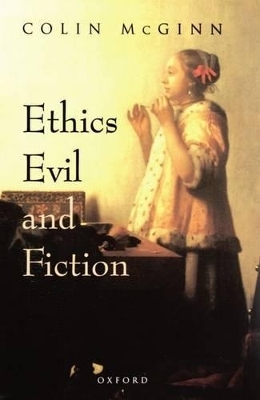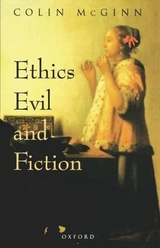
Ethics, Evil, and Fiction
Seiten
1997
Clarendon Press (Verlag)
978-0-19-823716-7 (ISBN)
Clarendon Press (Verlag)
978-0-19-823716-7 (ISBN)
Zu diesem Artikel existiert eine Nachauflage
Aimed at those interested in ethics or in the links between philosophy and literature, this book brings together moral philosophy and literary analysis in a way that offers new insights for both. Examining the relations between morality, art, and beauty, the author that morality is an area of objective truth and genuine knowledge.
Ethics, Evil, and Fiction brings together moral philosophy and literary analysis in a way that offers original new insights for both. Its central aim is to enrich the domain of moral reflection, by showing the value of literary texts as sources of moral illumination. Colin McGinn starts by setting out an uncompromisingly realist ethical theory, arguing that morality is an area of objective truth and genuine knowledge. He goes on to address such subjects as the nature of goodness, evil character, and the meaning of monstrosity, in the context of an aesthetic theory of virtue, which maintains that goodness of character is the same thing as beauty of soul. Works discussed include Billy Budd, Lolita, The Picture of Dorian Gray, and Frankenstein; and McGinn draws upon examples from film and painting as well as literature. The originality of his approach, the clarity and forthrightness of his writing, and his conviction that fiction and philosophy have much enlightenment to offer each other, make this a compelling and fascinating book.
Ethics, Evil, and Fiction brings together moral philosophy and literary analysis in a way that offers original new insights for both. Its central aim is to enrich the domain of moral reflection, by showing the value of literary texts as sources of moral illumination. Colin McGinn starts by setting out an uncompromisingly realist ethical theory, arguing that morality is an area of objective truth and genuine knowledge. He goes on to address such subjects as the nature of goodness, evil character, and the meaning of monstrosity, in the context of an aesthetic theory of virtue, which maintains that goodness of character is the same thing as beauty of soul. Works discussed include Billy Budd, Lolita, The Picture of Dorian Gray, and Frankenstein; and McGinn draws upon examples from film and painting as well as literature. The originality of his approach, the clarity and forthrightness of his writing, and his conviction that fiction and philosophy have much enlightenment to offer each other, make this a compelling and fascinating book.
Colin McGinn is Professor of Philosophy at Rutgers, the State University of New Jersey. He was previously Wilde Reader in Mental Philosophy at the University of Oxford, and before that Reader in Philosophy at University College London. His books include The Character of Mind (1981; second edition 1997), The Subjective View (1982), Mental Content (1989), The Problem of Consciousness (1991), and Problems in Philosophy (1993).
1. Introduction: The Scope of Moral Philosophy ; 2. Goodness ; 3. Knowledge of Goodness ; 4. The Evil Character ; 5. Beauty of Soul ; 6. The Picture: Dorian Gray ; 7. Who Is Frankenstein's Monster? ; 8. Conclusion: Stories and Morals
| Erscheint lt. Verlag | 3.7.1997 |
|---|---|
| Verlagsort | Oxford |
| Sprache | englisch |
| Maße | 147 x 224 mm |
| Gewicht | 377 g |
| Themenwelt | Geisteswissenschaften ► Philosophie ► Ethik |
| Geisteswissenschaften ► Philosophie ► Sprachphilosophie | |
| Geisteswissenschaften ► Sprach- / Literaturwissenschaft ► Anglistik / Amerikanistik | |
| Geisteswissenschaften ► Sprach- / Literaturwissenschaft ► Literaturgeschichte | |
| Geisteswissenschaften ► Sprach- / Literaturwissenschaft ► Literaturwissenschaft | |
| ISBN-10 | 0-19-823716-2 / 0198237162 |
| ISBN-13 | 978-0-19-823716-7 / 9780198237167 |
| Zustand | Neuware |
| Haben Sie eine Frage zum Produkt? |
Mehr entdecken
aus dem Bereich
aus dem Bereich
unsere kollektive Verantwortung
Buch | Hardcover (2023)
wbg Theiss in Wissenschaftliche Buchgesellschaft (WBG) (Verlag)
35,00 €



